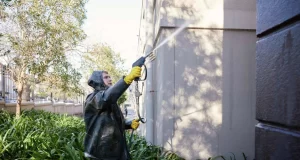
It is best to have the ground covered all year round. There is no right or wrong time to mulch. In winter, the straw or foliage mixture offers protection from frost, in summer rich nutrients for your plants. If you have freshly sown beds, wait before mulching. With seedlings larger than 10 cm, you can safely cover the soil up to the base of the leaves.
Manufacturers of lawn mowers have also recognized the practical benefits of the alleged grass waste. They are therefore now offering special garden supplies mulching lawn mowers shred the grass much finer than conventional machines. The resulting mulch is not only a real asset for beds, but also for the lawn itself. Therefore, the corresponding mulching lawn mowers usually do not have a collecting basket for the cut, but rather transport it directly back onto the lawn. There the mulch is then broken down again and thus supplies the soil and grass with nutrients.
Before you apply the mulch to your beds, the soil needs to be prepared accordingly. Remove weeds if necessary and loosen the soil a little with a spade. You can then start spreading the mulch. Make sure you apply the material around the plants, but keep a few inches away from the style or trunk. The plants do not get enough air there, rot can develop. When spreading, the height of the mulch layer is also decisive: the soil should be completely covered, but if the layer is too dense, the earth cannot breathe. A layer about 5 cm to 10 cm high is ideal. If in doubt, it is better to spread too little than too much mulch, afterwards you can always thicken the layer. This should lie loosely and not be worked into the earth. Lava mulch consists of volcanic rock and has a high mineral content . The granular layer is easy to walk on and does not rot compared to most types of mulch. Lava mulch also stores water and heat well, but it isusually more expensive to buy than bark mulch, for example. Alternatively, gravel or chippings are also suitable for mulching: The stones protect the soil from external influences and store heat. In contrast to bark mulch and other mulch material, however, they do not release any nutrients.
Lava mulch consists of volcanic rock and has a high mineral content . The granular layer is easy to walk on and does not rot compared to most types of mulch. Lava mulch also stores water and heat well, but it isusually more expensive to buy than bark mulch, for example. Alternatively, gravel or chippings are also suitable for mulching: The stones protect the soil from external influences and store heat. In contrast to bark mulch and other mulch material, however, they do not release any nutrients.
If you have a lot of waste wood in your yard available, for example by pruning trees, then you can shred them in a chopper . However, that the wood chippings bind a lot of nitrogen and can lead to a deficiency in the soil. If there are too many snails in your bed, mulching material made from reeds will help. Shredded herb plants are also great for keeping pests at bay.






